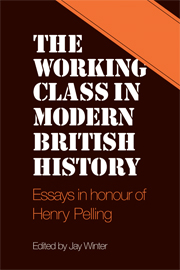Book contents
- Frontmatter
- Contents
- Introduction: labour history and labour historians
- I The working class in British politics
- II The working class in British society
- 7 Work and hobbies in Britain, 1880–1950
- 8 Credit and thrift and the British working class, 1870–1939
- 9 Intelligent artisans and aristocrats of labour: the essays of Thomas Wright
- 10 Anglo-Marxism and working-class education
- 11 Did British workers want the welfare state? G. D. H. Cole's Survey of 1942
- 12 Images of the working class since 1930
- 13 Unemployment, nutrition and infant mortality in Britain, 1920–50
- List of the published writings of Henry Felling
- Notes
- Index
10 - Anglo-Marxism and working-class education
Published online by Cambridge University Press: 05 November 2011
- Frontmatter
- Contents
- Introduction: labour history and labour historians
- I The working class in British politics
- II The working class in British society
- 7 Work and hobbies in Britain, 1880–1950
- 8 Credit and thrift and the British working class, 1870–1939
- 9 Intelligent artisans and aristocrats of labour: the essays of Thomas Wright
- 10 Anglo-Marxism and working-class education
- 11 Did British workers want the welfare state? G. D. H. Cole's Survey of 1942
- 12 Images of the working class since 1930
- 13 Unemployment, nutrition and infant mortality in Britain, 1920–50
- List of the published writings of Henry Felling
- Notes
- Index
Summary
Any history of Marxism in Britain has to deal with the complex personality and ideas of H. M. Hyndman. He was the first protagonist of Marxism, albeit of his own peculiar brand, in this country. His idiosyncratic presence, though, can distort the record of Anglo-Marxism by making it fit the oddly-shaped mould which he and others fashioned at the end of the nineteenth century and after. It is the intention of this essay to re-interpret aspects of the history of Anglo-Marxism not in terms of his personal beliefs, but rather in terms of the development of an institution which attempted to work out the legacy of his Marxism and that of the Social Democratic Federation (SDF) in the years after his death. The organization in question is the National Council of Labour Colleges (NCLC), which started out as a vehicle for the dissemination of Anglo-Marxism and within two decades ended up as part of the Trades Union Congress (TUC), dedicated to forwarding the ideas of the Labourist consensus. In this transformation it is possible to see some of the peculiarities and contradictions which have beset Marxism, English-style, in this century.
The origins of independent working-class education can be traced back to the foundation of the London Mechanics Institute in the 1820s and further back to the activities of the London Corresponding Society at the time of the French Revolution.
Information
- Type
- Chapter
- Information
- The Working Class in Modern British HistoryEssays in Honour of Henry Pelling, pp. 187 - 199Publisher: Cambridge University PressPrint publication year: 1983
Accessibility standard: Unknown
Why this information is here
This section outlines the accessibility features of this content - including support for screen readers, full keyboard navigation and high-contrast display options. This may not be relevant for you.Accessibility Information
- 1
- Cited by
